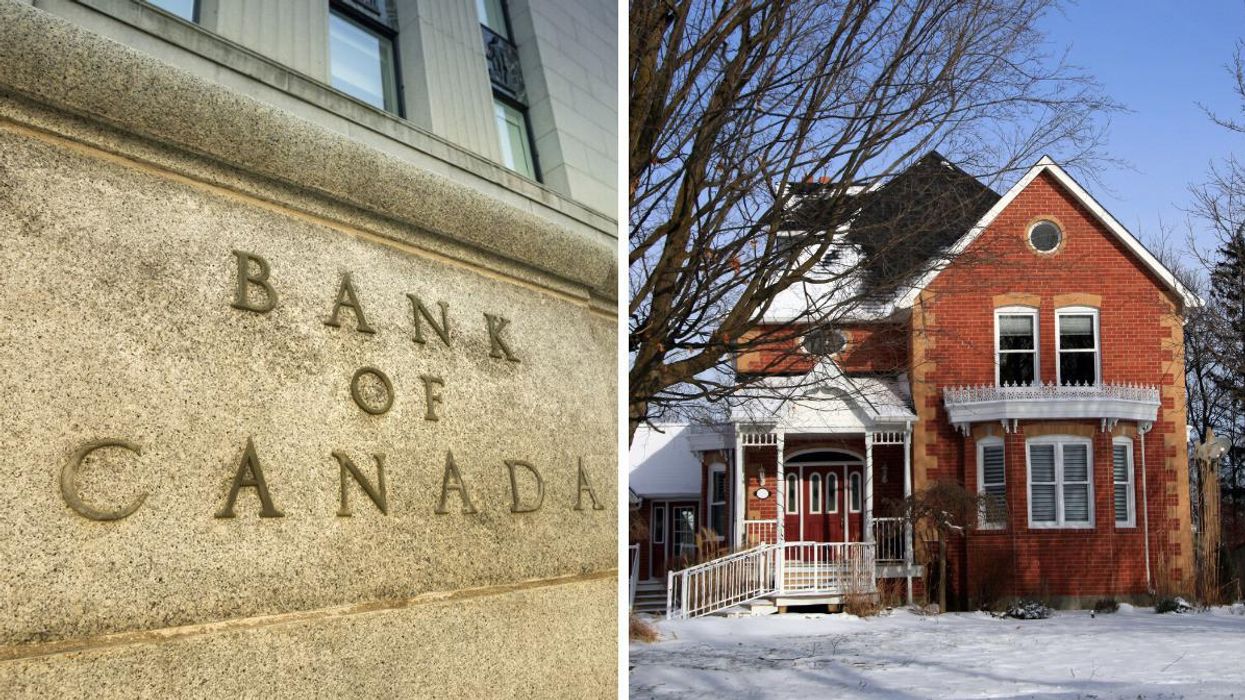Canada's Interest Rate Is Increasing & Here's What That Means For You
Homebuyers could see the biggest impact. 🏠

Bank of Canada building exterior. Right: A Canadian house in winter.
On Wednesday, March 2, the Bank of Canada increased the interest rate from 0.25% to 0.50%, which is something that may impact your wallet, depending on your financial situation.
The interest rate set by the Bank of Canada determines the cost of investment and credit between banks, which in turn affects the cost of borrowing for people across the country.
That's because when the interest rate is increased, it leads to loans being more expensive for regular consumers.
This is something that mortgage expert Leah Zlatkin says could "present an issue" for new home buyers or for those whose mortgage might be renewed.
"This overnight interest rate increase will mean no immediate change for those with a fixed-rate mortgage," Zlatkin said in a statement shared with Narcity. "Even so, fixed rates are going up, which could present an issue at renewal time for those that locked in at a fixed rate of under two per cent in 2020 or 2021."
So, if your interest rate was fixed when you got it — meaning it will stay the same throughout your mortgage term — you should be in the clear until you need to renew.
However, you could see a hit to your wallet depending on your renewal plan and, with rates going up, this could negatively affect those taking out a mortgage for the first time.
But even if you're someone with a variable rate — a rate that goes up and down in accordance with the prime interest rate — it's not all bad news.
"Today's variable rates are still very low," said Zlatkin. "It will take multiple increases to push variable rates up enough to make them comparable to today's fixed rates."
The overnight interest rate increase is a strategy by the Bank of Canada to combat inflation, which hit a 30-year high in January 2022 and now sits at 5.1%, according to CBC News.
This article's cover image was used for illustrative purposes only.
- Here's How Justin Trudeau's Government Plans To Make Buying A ... ›
- The Bank Of Canada Says The Inflation Rate Will Stay Sky High ... ›
- Gas Prices Are Rising Across Canada & Costs Could Be About To Reach An All-Time High - Narcity ›
- Canada's Inflation Rate Is at A 30-Year High & Here's What That Means For Your Wallet - Narcity ›
- Experts Say Canada's Interest Rate Could Increase 3 Times This Year & Here's What That Means - Narcity ›
- Here's How To Save On Your Mortgage In Canada If You've Been Impacted By Interest Rate Hikes - Narcity ›
- Canada's Inflation Rate Is The Highest It's Been Since 1983 & Here's What You're Paying More For - Narcity ›